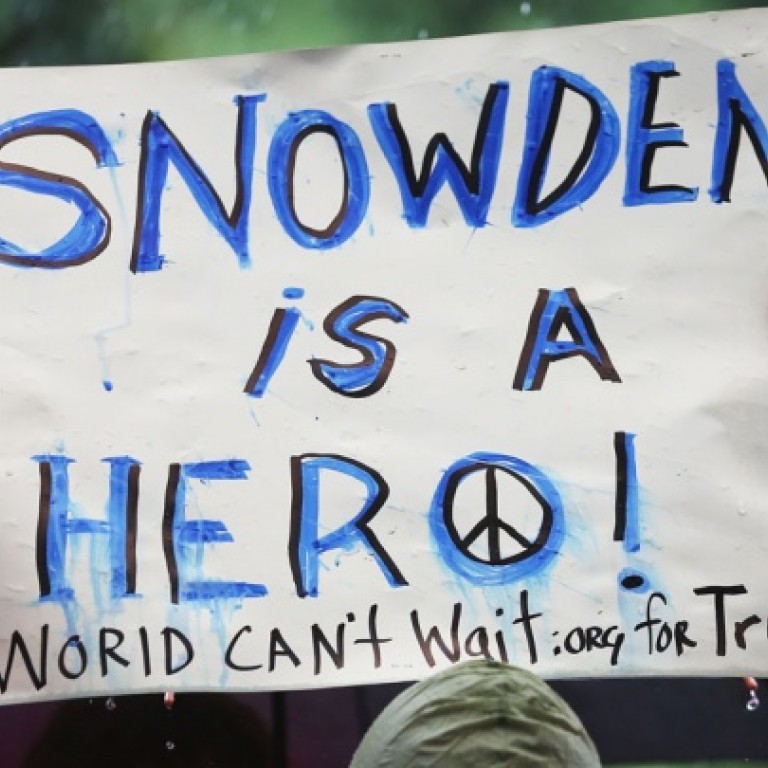
Edward Snowden: the NSA contractor who sacrificed all for good conscience
How idealism turned to a belief he was part of 'something doing far more harm than good'
The individual responsible for one of the most significant leaks in US political history is Edward Snowden, a 29-year-old former technical assistant for the CIA and current employee of the defence contractor Booz Allen Hamilton.
Snowden has worked at the National Security Agency for the past four years as an employee of various outside contractors, including Booz Allen and Dell. He had "a very comfortable life" that included a US$200,000 salary, a girlfriend with whom he shared a home in Hawaii, a stable career and a family he loves.
"I'm willing to sacrifice all of that because I can't in good conscience allow the US government to destroy privacy, internet freedom and basic liberties for people around the world with this massive surveillance machine they're secretly building," he said.
Three weeks ago, Snowden made preparations that resulted in last week's series of blockbuster news stories. At the NSA office in Hawaii where he worked, he copied the last set of documents he intended to disclose. He then advised his NSA supervisor that he needed to be away from work for "a couple of weeks" to receive treatment for epilepsy. As he packed his bags, he told his girlfriend he had to be away for a few weeks, though he was vague about the reason.
On May 20, he boarded a flight to Hong Kong, where he has remained ever since.
Snowden did not always believe the US government posed a threat to his political values. In 2003, he enlisted in the US Army and began a training programme to join the Special Forces. Invoking the same principles that he now cites to justify his leaks, he said: "I wanted to fight in the Iraq war because I felt like I had an obligation as a human being to help free people from oppression."
His beliefs about the war's purpose were quickly dispelled. "Most of the people training us seemed pumped up about killing Arabs, not helping anyone," he said. After he broke both of his legs in a training accident, he was discharged.
After that, he got his first job in an NSA facility, as a guard. From there, he went to the CIA, where he worked on IT security. His understanding of the internet and his talent for programming enabled him to rise fairly quickly for someone who lacked even a high school diploma.
By 2007, the CIA stationed him with diplomatic cover in Geneva, Switzerland. His responsibility for maintaining computer security meant he had access to a wide array of classified documents. That access, along with the almost three years he spent around CIA officers, led him to begin seriously questioning the rightness of what he saw.
"Much of what I saw in Geneva really disillusioned me about how my government functions and what its impact is in the world," he said. "I realised that I was part of something that was doing far more harm than good."
He said it was during his CIA stint in Geneva when he thought for the first time about exposing government secrets. But at the time he chose not to for two reasons. First, he said, "most of the secrets the CIA has are about people, not machines and systems, so I didn't feel comfortable with disclosures that I thought could endanger anyone". Secondly, the 2008 election of US President Barack Obama gave him hope that there would be real reforms.
He left the CIA in 2009 to work for a private contractor that assigned him to a functioning NSA facility, stationed on a military base in Japan. It was then, he said, that he "watched as Obama advanced the very policies that I thought would be reined in" and as a result "I got hardened".
Over the next three years, he learned just how all-consuming the NSA's surveillance activities are. He describes how he once viewed the internet as "the most important invention in all of human history".
But he believes that the value of the internet, along with basic privacy, is being rapidly destroyed by ubiquitous surveillance. "I don't see myself as a hero," he said, "because what I'm doing is self-interested: I don't want to live in a world where there's no privacy and therefore no room for intellectual exploration and creativity."
As strong as those beliefs are, there still remains the question: why did he do it? Giving up his freedom and a privileged lifestyle? "There are more important things than money. If I were motivated by money, I could have sold these documents to any number of countries and gotten very rich."
For him, it is a matter of principle. "The government has granted itself power it is not entitled to. There is no public oversight. The result is people like myself have the latitude to go further than they are allowed to," he said. Asked to establish his authenticity, he laid bare, without hesitation, his personal details, from his social security number to his CIA ID and his expired diplomatic passport. There is no shiftiness. Ask him about his personal life and he will answer.
He is quiet, smart, easy-going and self-effacing. A master on computers, he seemed happiest when talking about the technical side of surveillance, at a level of detail comprehensible probably only to fellow communication specialists. But he showed intense passion when talking about the value of privacy and how he felt it was being steadily eroded by the behaviour of the intelligence services.
His manner was calm but he has been understandably twitchy since he went into hiding, waiting for the knock on the hotel door. A fire alarm goes off. "That has not happened before," he says, betraying anxiety: wondering if was real, a test or a CIA ploy to get him out on to the street.
